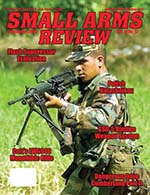By Robert M. Hausman
Mexican authorities handpicked for tracing the firearms that were used to bolster the claim that “more than 90 percent of about 11,000 guns tied to violence in Mexico’s drug wars came from the United States,” according to a report appearing in the El Paso Times.
The Mexican federal attorney general’s staff recently acknowledged that Mexican authorities had seized 35,943 arms, including 2,800 grenades, since the crackdown against the drug cartels began in December 2006. That means Mexico provided the U.S. Bureau of Alcohol, Tobacco, Firearms and Explosives with serial numbers for less than a third of the weapons that were seized.
Earlier this year, officials of the ATF stated publicly that 90 percent of the weapons recovered in Mexico in connection with drug violence were traced to the United States.
Using the ATF’s 90 percent figure, President Barack Obama and Mexico’s ambassador to the United States, Arturo Sarukhan, said U.S. guns were fueling drug violence in Mexico.
But the 90 percent figure was overblown because Mexico did not provide the ATF with serial numbers for all the weapons it seized, according to information obtained by the El Paso Times through the Freedom of Information Act.
“During fiscal years (October through September) 2007 and 2008, Mexico submitted to ATF 11,055 crime guns to be traced. ATF determined that 94 percent of those crime guns originated from various sources within the United States,” the ATF said adding “It is important to note that the 94 percent figure only relates to the crime guns that Mexico provided to ATF to be traced.”
An ATF spokesman also said that about 2,800 of the 11,055 weapons were imported to the United States from other countries before they ended up in Mexico, adding “a small percentage could not be determined to have a nexus to the United States.”
The ATF did not respond to other questions posed by reporters about the traced weapons, such as how many were tracked to U.S. foreign military exports or U.S. direct commercial sales.
It is widely believed that most of the seized weapons were not traced because of corruption in Mexico. Police in Mexico are thought to not submit the serial numbers of high-value guns, such as military-grade firearms, because they keep them for themselves.
“The 90 percent figure is being recklessly tossed around,” said Andrew Arulanandam, spokesman for the NRA in Washington. “It is a calculated attempt to pin the tragedy of the Mexican drug wars on the American people and the Second Amendment. The first step to fixing the problem is for Mexico to make sure the rampant corruption that exists in law enforcement, the military, judiciary and even among politicians, is eradicated.”
The United Nations and Amnesty International are among the organizations that lobby for global gun control. Harold Kohn, Obama’s nominee for legal adviser to the State Department, is on record advocating global gun control.
ATF Expands Caribbean Region eTrace Reach
The Bureau of Alcohol, Tobacco, Firearms and Explosives (ATF) has signed a memorandum of understanding (MOU) that will provide eTrace, an electronic system used to trace illicit firearms with the Ministry of Justice and Police of the Government of Suriname. This is an ongoing effort to combat firearms trafficking in the region consistent with the December 2007 joint Caribbean Community (CARICOM)-U.S. Initiative on Combating the Illicit Trafficking in Small Arms and Light Weapons and Ammunition. (For additional information see website: www.state.gov/p/wha/rls/120209.htm)
eTrace is a paperless firearm trace submission system that is accessible through a secure Internet connection. ATF processed more than 300,000 crime-gun trace requests in fiscal year 2008, including traces from 58 countries. The other countries in the region that have eTrace capabilities include Antigua and Barbuda, Bahamas, Barbados, Belize, Colombia, Costa Rica, Dominica, Dominican Republic, El Salvador, Grenada, Guatemala, Guyana, Honduras, Jamaica, Panama, Mexico, St. Kitts and Nevis, St. Lucia, St. Vincent and the Grenadines, and Trinidad and Tobago.
Unauthorized Versions of ATF Application Forms
The Federal Firearms Licensing Center (FFLC) reports it is receiving unauthorized versions of ATF Form 7CR, Application for Federal Firearms License (Collector of Curio and Relics) from curio/relic firearms collector applicants.
Any FFL applications submitted on other than officially approved ATF forms will not be accepted for processing by the FFLC. The unauthorized forms have been modified from the official ATF version and made available to applicants on public Internet sites without the express permission of ATF.
FFL applications on forms other than those officially approved and issued by ATF will be returned with instructions on how to order official application forms from ATF’s Distribution Center (www.atf.gov/dcof/index.htm). Please contact the FFLC at (304) 616-4600 with any questions about this policy.
Most of ATF’s forms are available in a PDF format on the ATF Website (www.atv.gov) and also from www.atf.gov/forms/3000.htm.
ATF Reform Bill Introduced in Both House & Senate
Following the recent introduction of a Senate bill designed to strike a balance between providing ATF with additional regulatory powers and affording licensees more rights and due process in the regulatory process, Reps. Steve King (R-Iowa) and Zack Space (D-Ohio) have introduced similar legislation in the House of Representatives. The legislation would allow ATF new powers to issue fines and suspend licenses of federal firearms licensees (as opposed to current regulations which only allow for license revocation) and would also define what a “willful” violation is. The bill also calls for revocation hearings to be heard before an administrative law judge, rather than an ATF official. The bill however, does allow what many believe to be “excessive” punitive fines to be imposed, which could have the same effect as license revocation through financial ruination.
This article first appeared in Small Arms Review V12N12 (September 2009) |
| SUBSCRIBER COMMENT AREA |
Comments have not been generated for this article.



